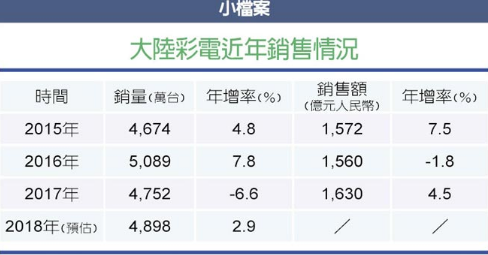In 2017, the retail volume of mainland color TVs decreased by 6.6% annually. The analysis pointed out that in addition to the need to accelerate the switch between new and old technologies and intelligent applications, and the Internet TV market has faded with the collapse of LeTV, it may become an opportunity for the color TV industry to make a comeback. The mainland color TV market has encountered an unprecedented dilemma in the past 14 years. According to statistics from industry consulting organizations, the retail sales of the mainland's color TV industry reached 163 billion yuan last year. Although an annual increase of 4.5%, sales of 47.52 million units, a year-on-year decrease of 6.6%, are the worst sales in recent years. However, the sales volume of Yikang, another data company, is even more bleak, with a drop of 8.1%. The color TV market is in the most difficult period in recent years. According to reports, Dong Min analyzed that the first is the rapid expansion of the color TV market in the past few years, and the current market is gradually saturated. In addition, the prices of upstream raw materials continue to rise. From April 2016 to June 2017, LCD panels of various sizes have risen by 20% to 50%, and the cost of panels accounts for 70% of the cost of color TV sets. The manufacturing cost pressure is visible. In addition, the effects of excessive sales of Internet TV are equivalent to overdrafting the actual market demand. Since May 2013, LeTV founder Jia Yueting has launched a "double performance, half price" LeTV Super TV, that is, Internet TV. After that, major mobile phone manufacturers such as Xiaomi began to enter the Internet TV market. According to industry insiders, LeTV did not hesitate to sell below cost in order to seize the market. It not only quickly divided up the sales of the traditional color TV market, but also allowed market demand to overdraft early. In addition to the negative effects of market overdrafts, LeTV’s financial crisis also has a negative impact on the Internet TV industry. Many Internet TV brands ended last year. Regardless of general color TV or Internet TV, they are looking for a new position. For the color TV industry, this is a good time to "make a comeback". For example, TCL, a leading domestic color TV and home appliance company, sold 23.774 million LCD TVs last year, an annual increase of 15.9%. Its CEO, Wang Cheng, is quite optimistic about the market outlook and believes that the color TV industry has gradually returned to its rationale and will continue to grow steadily this year. However, consumer electronics industry analyst Liu Buchen said that despite the decline in Internet TV sales, there are still not too many mainland domestic brands to make up. If you consider the technological content, brand impression, and promotion effects of new TVs, the sales of Japanese brands Sony and Sharp will be reversed. It looks quite improving. It believes that, in addition to the above-mentioned two Japanese brands, the impression and sense of technology are superior to mainland domestic home appliance brands to seize the color TV market. However, analysts believe that mainland domestic brands are not completely without the opportunity to stand up. In order to enhance product innovation and technology, a number of local brands have substantially increased AI research and development last year. Take Hisense, a major home appliance manufacturer, in January this year launched AI TV with precise voice recognition, semantic understanding, and image interaction technology. Konka, another color TV manufacturer, has expanded the application of AI to the fields of TVs and white goods, further forming a smart home plan with AI TV as the core. In addition, Changhong's latest AI home appliance products allow TVs to play the role of security equipment in the future, which can identify actions, movies and record dynamic information about family life. Regarding the breakthrough innovation of major home appliance manufacturers, Liu Buchen reserved his words, believing that the marketing color of AI TVs is still greater than that of technology, and for consumers, the willingness to buy will not necessarily increase as a result. It remains to be seen whether this revival of the traditional color TV industry will succeed.
On the premise of having mature motor design capabilities and high-precision process support capabilities (including automatic CNC metal processing technology, automatic high-speed precision motor stator and rotor punching production process lights), the low Servo Motor built by Kassel can be compatible with ac servo motors. The drive is perfectly matched to maximize the power and performance of the equipment, output unparalleled power density and motion control effects, simple and cost-effective.
Low Inertia Servo Motor,Low Inertia Motor,Low Inertia Servo Motor Control,Low Inertia Servo Motor Robot Kassel Machinery (zhejiang) Co., Ltd. , https://www.kasselservo.com